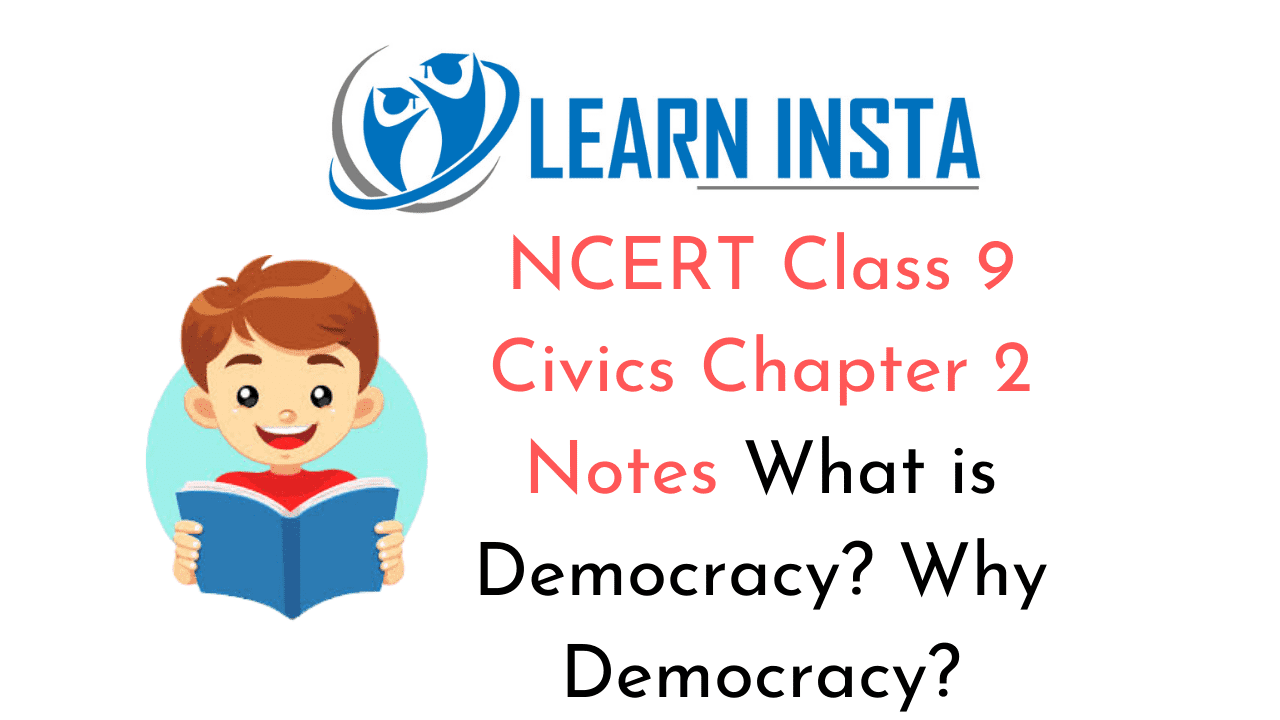
On this page, you will find NCERT Class 9 Civics Chapter 2 Notes Pdf free download. CBSE Class 9 Social Science Notes Civics Chapter 2 SST What is Democracy? Why Democracy? will seemingly, help them to revise the important concepts in less time.
What is Democracy? Why Democracy? Class 9 Notes Social Science Civics Chapter 2
CBSE Class 9 Civics Chapter 2 Notes Understanding the Lesson
1. Democracy is a form of government in which the rulers are elected by the people. It is the most prevalent form of government in the world today and it is expanding to more countries. It is better than other forms of government.
2. In a democracy, major decisions are taken by those elected by the people. A democracy must be based on a free and fair election where those currently in power have a fair chance of losing.
3. Democracy is based on a fundamental principle of political equality. It means that in a democracy, each adult citizen must have one vote and each vote must have one value.
4. A democratic government cannot do whatever it likes, simply because it has won an election. It has to respect some basic rules. In particular it has to respect some guarantees to the minorities.
5. Democracy is better than other forms of government because it is a more accountable form of government. It improves the quality of decision-making and enhances the dignity of citizens. Democracy also allows us to correct its own mistakes.
6. arguments are given against democracy-leaders keep changing in democracy which leads to instability, democracy is all about political competition and power play, democracy leads to corruption for it is based on electoral competition, etc.
7. Democracy cannot get us everything and it is not the solution to all problems. But it is clearly better than any other alternatives that we know. It offers better chances of a good decision.
8. The most common form that democracy takes in our times is that of representative democracy. In the countries we call democracy, all the people do not rule. A majority is allowed to take decisions on behalf of all the people. Even the majority does not rule directly. The majority of people rule through their elected representatives.
9. It is also important to distinguish between a democracy and a good democracy. A good democracy is dedicated for the cause of the poor and the helpless. A good democracy is that which provides every citizen equal right to vote, equal information, basic education and equal resources.
10. No country is a perfect democracy. However, every democracy has to try to realise the ideals of a democratic decision-making. This cannot be achieved once and for all. This requires a constant effort to save and strengthen democratic forms of decision-making.
11. We as citizens can also play important role in making our country more or less democratic. Other forms of government do not require all citizens to take part in politics. But democracy depends on active political participation by all the citizens.
What is Democracy? Why Democracy? Class 9 CBSE Notes Important Terms
Democracy: A form of government in which rulers are elected by the people.
Contemporary: Living or occurring at the same time.
Election: A formal decision-making process by which a population chooses an individual to hold public office.
Designation: A official name, description, or title.
Malpractices: Injurious, negligent, or improper practices.
Campaign: An organised effort which seeks to influence the decision-making process within a specific group.
Autocratic: Relating to a ruler who has absolute power.
Accountable: Required or expected to justify actions or decisions; responsible.
Minority: The smaller number or part, especially a number or part representing less than half of the whole.